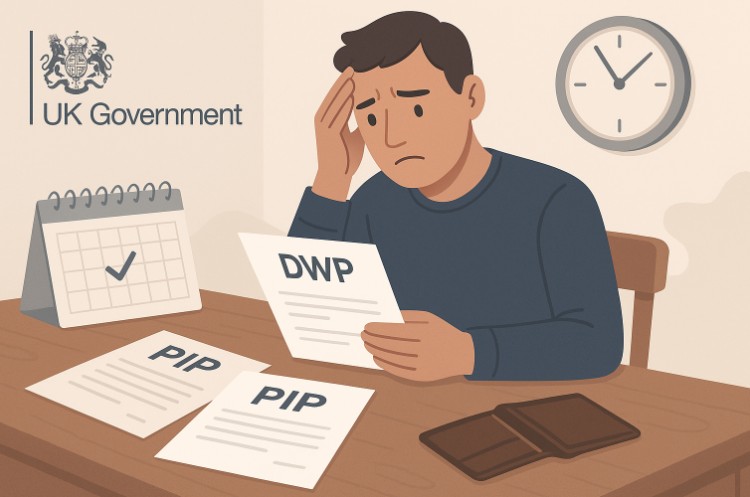Navigating the rules around receiving UK benefits while spending time abroad can be challenging.
Whether someone is planning a short holiday, receiving medical treatment overseas, or considering a more permanent move, it’s essential to understand the impact on their entitlements.
The Department for Work and Pensions (DWP) has strict criteria regarding the duration of time benefit recipients can spend outside the UK, depending on the specific benefit and their circumstances.
In this comprehensive guide, we’ll explore how long someone can stay abroad without losing their UK benefits, what benefits are exportable, and what steps need to be taken before leaving the country.
What Are the Rules for Claiming UK Benefits While Abroad?

The rules around claiming UK benefits while abroad are designed to ensure that claimants maintain a strong connection to the UK and that public funds are protected from misuse.
The Department for Work and Pensions (DWP) and other government agencies define these rules based on benefit type, the destination country, and the length and purpose of travel.
Understanding Benefit Categories and Exportability
UK benefits are generally categorised into three types:
- Contributory Benefits: Based on National Insurance contributions (e.g., State Pension, contribution-based ESA)
- Non-contributory Benefits: Based on disability or care needs (e.g., PIP, DLA, Attendance Allowance)
- Means-tested Benefits: Based on income and savings (e.g., Universal Credit, Housing Benefit)
Each category has different rules regarding whether the benefit can be paid while someone is outside the UK.
Temporary vs Permanent Absence
There is a significant distinction between a temporary absence and a permanent move. Most benefits allow a temporary absence abroad, provided that:
- The trip lasts no more than 4 weeks in most cases
- The claimant maintains residency ties to the UK
- The absence is for a valid reason, such as a holiday, medical treatment, or family emergency
For longer absences, such as moving abroad permanently, eligibility may end unless the individual qualifies under special agreements, such as the EU-UK Withdrawal Agreement.
Destination-Specific Rules
The rules can vary depending on the destination. For example:
- EEA countries and Switzerland: Some benefits may still be claimable if covered by the Withdrawal Agreement
- Countries with reciprocal agreements: The UK has social security arrangements with countries like the USA, Canada, and New Zealand
- Other countries: Most non-agreement countries do not allow benefit export
Claimants should always consult government guidance to see if their benefit can be exported to the country they are travelling to or residing in.
Notification Requirements
Before going abroad for more than 4 weeks, claimants must inform:
- The DWP, if receiving working-age or disability benefits
- HMRC, for Tax Credits or Child Benefit
- The Local Authority, if receiving Housing Benefit or Council Tax Reduction
Failure to notify may result in overpayments, benefit suspension, or investigations for potential fraud.
How Long Can Someone Stay Abroad Without Losing Universal Credit?
Universal Credit is a means-tested benefit that supports individuals and families on low income or out of work. It has strict residency requirements, and being outside the UK can directly impact eligibility and payment continuity.
The 4-Week Absence Rule
Claimants of Universal Credit are permitted to be temporarily abroad for a maximum of 4 consecutive weeks. During this time:
- The claimant must remain eligible for Universal Credit
- In most cases, they must continue fulfilling work-related commitments
- The DWP must be notified in advance of the absence
If these conditions are not met, the Universal Credit payments may be paused or terminated.
Exceptions to the 4-Week Limit
There are a few scenarios where the DWP may allow an extended absence from the UK without affecting Universal Credit eligibility:
- Medical treatment abroad that is approved and time-limited
- Death or serious illness of a close relative overseas
- Assisting in the death arrangements of a close family member
In such cases, the absence may be extended up to 8 weeks, but this is not automatic and requires official approval and documentation.
What Happens if You Stay Longer Than Allowed?
If a claimant stays abroad for more than 4 weeks without meeting the exception criteria or notifying the DWP, their benefit may be stopped. In addition:
- The DWP may reclaim any overpaid amounts
- The individual may have to submit a new claim upon return
- It could affect the habitual residence status, impacting future eligibility
Resuming Universal Credit after a long absence is not guaranteed and may involve reassessment of circumstances, including financial situation and employment status.
Reporting Absence and Staying Compliant
Claimants must report all of the following details before travelling:
- The reason for the absence
- The date of departure and return
- The country of destination
- Any changes to employment status or income while abroad
These details can usually be reported via the Universal Credit online journal, by phone, or by contacting the Jobcentre Plus.
Even while abroad, Universal Credit claimants may be required to:
- Search for work (if in the intensive work search group)
- Attend interviews or appointments remotely, if instructed
- Provide updates on job applications and availability
Failure to comply with these requirements can result in sanctions, payment delays, or closure of the claim.
Can You Receive Personal Independence Payment (PIP) Outside the UK?

Personal Independence Payment is partially exportable, and claimants may be able to continue receiving it under specific rules.
The DWP allows recipients to be abroad for up to 13 weeks (or 26 weeks if the travel is for medical treatment) without losing their entitlement to the daily living component of PIP.
However, the mobility component of PIP is not payable if the person is no longer living in the UK permanently.
For longer-term stays in EEA countries or Switzerland, claimants must meet additional criteria:
- Be covered under the EU-UK Withdrawal Agreement
- Maintain a genuine and sufficient link to the UK
- Pass the habitual residence test
The care component of DLA for adults and Attendance Allowance may also be paid abroad, but only under similar limited conditions.
What Happens to Employment and Support Allowance (ESA) If You Go Abroad?
Employment and Support Allowance (ESA) provides financial help to individuals who are ill or disabled and unable to work. There are two types of ESA: contribution-based and income-related.
ESA Payment Rules Abroad
| Type of ESA | Max Time Abroad | Exportable? | Notes |
| Contribution-based ESA | 4–26 weeks | Yes | Up to 26 weeks for medical treatment; otherwise 4 weeks |
| Income-related ESA | Varies | Rarely | May stop immediately if not residing in UK |
Recipients of contribution-based ESA may continue to receive payments for up to 26 weeks if they are undergoing approved medical treatment abroad.
Income-related ESA, on the other hand, generally requires the claimant to be residing in the UK and is suspended once the claimant leaves the country.
The DWP must be informed before any travel. Claimants who fail to notify could be subject to overpayments or recovery proceedings.
Are There Special Rules for Pensioners Receiving UK State Pension Abroad?
Unlike many working-age benefits, the UK State Pension is fully exportable and can continue to be paid to individuals living overseas. However, whether the pension increases each year depends on the country of residence.
UK State Pension Abroad – Uprating Eligibility
| Country Category | Annual Increase? | Notes |
| EEA countries + Switzerland | Yes | Covered by agreement |
| Countries with UK social security deal | Yes | Includes USA, Canada, New Zealand, etc. |
| All other countries | No | Pension is frozen at first payment rate |
Although recipients can continue to claim their State Pension abroad, they may lose out on the annual uprating unless their country has a reciprocal agreement with the UK.
Pension Credit, however, is not payable outside the UK. It is strictly for individuals living in the UK, and the entitlement ends once someone leaves for a significant period or permanently.
How Does the Habitual Residence Test Affect Your Eligibility Abroad?

The Habitual Residence Test (HRT) is applied to determine whether a person is eligible to receive certain UK benefits.
If someone travels abroad or moves permanently, they may no longer be deemed habitually resident.
To pass the HRT, a person must:
- Intend to stay in the UK for the foreseeable future
- Have established a home and regular routine in the UK
- Be able to demonstrate ties, such as employment, family, or housing
An extended stay abroad or moving to another country for work or retirement could cause the individual to fail this test, making them ineligible for many benefits upon their return unless they re-establish residency.
Do You Need to Inform the DWP Before Travelling or Moving Abroad?
Yes, it is a legal requirement to notify the DWP or other relevant authorities (e.g., HMRC, your local council) before travelling abroad, especially if you expect to be away for more than 4 weeks.
What to inform:
- Departure and return dates
- Destination country
- Reason for travel
- Whether the travel is temporary or permanent
Not informing the DWP may lead to benefit overpayments. In some cases, individuals may be required to repay the amount received or face investigations for benefit fraud.
It’s also important to note that travel to Northern Ireland, the Channel Islands, or the Isle of Man is still considered being abroad for the purpose of many benefit regulations, even though these areas are within the UK.
What Benefits Are Most at Risk When Living or Travelling Abroad?
Certain UK benefits are more vulnerable to suspension or termination when the claimant is no longer residing in the country. In particular, means-tested and non-contributory benefits tend to have the strictest rules.
Some of the key benefits and their limitations:
- Housing Benefit: Typically ends after 4 weeks abroad unless exceptional circumstances apply
- Universal Credit: Stops if work commitments are not met or if absence exceeds allowed period
- Carer’s Allowance: May continue for up to 4 weeks of holiday within a 26-week period if the caring continues
- Disability benefits: Care components may be paid abroad under the Withdrawal Agreement, but mobility components are not
Minimal bullet points for quick reference:
- Inform authorities before travelling
- Understand exportability of each benefit
- Review country-specific agreements
- Keep proof of travel and communication
Failing to meet the conditions for continued payment while abroad may result in:
- Loss of benefit
- Suspension of future payments
- Legal obligation to repay
Is It Possible to Resume Benefits After Returning to the UK?

If a person returns to the UK after a temporary absence abroad, they may be able to resume their benefits, but there are several conditions to meet.
Key steps to resume benefits:
- Re-establish habitual residence in the UK
- Inform the DWP or benefit office about the return
- Provide documentation such as proof of address, date of return, or employment status
In some cases, a new application may be required, especially if the previous claim has been closed or if too much time has passed.
Individuals must also ensure they meet the eligibility criteria again upon their return, including income, savings, and employment checks for means-tested benefits.
Conclusion
Understanding how long one can stay abroad without losing UK benefits is essential for avoiding disruptions in payments and maintaining compliance with DWP regulations.
Each benefit has specific rules, and eligibility depends on factors such as length of stay, destination, and reason for travel.
To avoid penalties or benefit loss, individuals should always check the latest government guidance, inform the relevant authorities before travelling, and ensure they meet all requirements if planning to return and resume claiming their benefits.
Frequently Asked Questions
Can I go abroad for more than four weeks if I receive Universal Credit?
No, Universal Credit generally allows only a four-week absence. In exceptional cases, such as a bereavement or medical emergency, it may be extended.
Will my State Pension be affected if I move to a non-EEA country?
You will still receive your pension, but it may not increase annually unless your country has a social security agreement with the UK.
Can I claim Carer’s Allowance while on holiday?
Yes, Carer’s Allowance can continue during up to 4 weeks’ holiday within a 26-week period, provided care responsibilities remain in place.
What if I don’t inform the DWP before travelling abroad?
You risk losing your benefits, may need to repay overpayments, and could face legal action for benefit fraud.
Is it possible to transfer PIP to another country permanently?
Only the daily living component can be exported to some countries. The mobility component is not payable abroad.
What benefits can I claim if I move to the EU or Switzerland?
If covered by the Withdrawal Agreement, you may be able to claim PIP, Attendance Allowance, or DLA depending on eligibility and residency.
What does ‘habitually resident’ mean?
It means having a settled intention to stay in the UK and being physically present long enough to be considered a resident under UK benefit rules.






